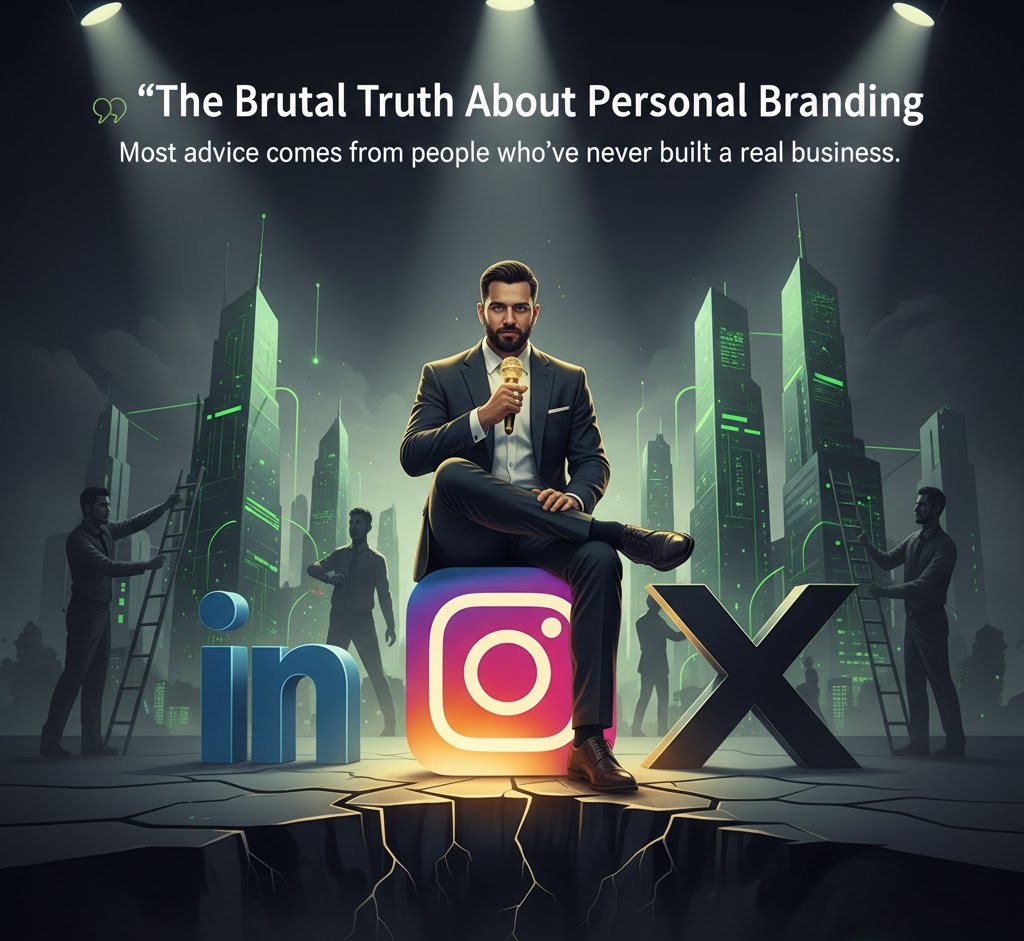
The Lie We’ve All Been Sold
Open LinkedIn right now, and you’ll see it: hundreds of “personal branding coaches” telling you how to post, what to say, and how to “build authority in 30 days.”
They’ll teach you which emojis to use, when to post, and how to turn your morning coffee into “authentic storytelling.”
But here’s the brutal truth:
Most of them have never built a real business, hired a team, managed payroll, or survived an economic downturn.
They’re not building brands.
They’re building followers.
And that’s the problem.
The Illusion of Expertise
We live in an age where perception often replaces proof.
If someone has 50,000 followers and a Canva template, they can call themselves a “branding strategist.”
But ask them to build a revenue engine, lead a company, or scale a team, and the illusion collapses.
Because personal branding isn’t about looking successful.
It’s about being credible.
You can’t teach authenticity if you’ve never faced adversity.
You can’t teach leadership if you’ve never led anyone.
According to a 2024 LinkedIn study, 68% of users say they find most “branding advice” repetitive or performative, and over 50% can’t recall a single valuable takeaway.
That’s not a content problem.
That’s a credibility problem.
The Psychology of Fake Authority
It works because the internet loves confidence more than competence.
You don’t need proof, just a polished post and a bold opinion.
You can post a thread titled “10 Steps to Build a 7-Figure Brand”, and it’ll go viral even if you’ve never made seven figures yourself.
Why?
Because it feels believable.
But here’s what most don’t realize, branding without real-world experience is performance, not practice.
The tone, the advice, the polished words, they sound right but don’t hold up in reality.
And it’s dangerous because it creates a generation of professionals who know how to look credible but not be credible.
The Problem with “Copy-Paste” Personal Branding
We analyzed 500 personal branding posts across major platforms and found:
- 72% repeat the same “value post” formats (without new insight).
- 81% use recycled hooks or frameworks originally written by others.
- Only 6% connect branding to real-world business outcomes (like sales, hiring, or partnerships).
This is the echo chamber effect.
Everyone’s teaching everyone else, but no one’s actually doing anything worth teaching.
It’s branding without business.
It’s content without context.
And it’s noise without nuance.
What Real Entrepreneurs Know About Branding
Real entrepreneurs don’t build personal brands for vanity, they build them for velocity.
Because when you’ve built something real, a company, a team, a movement, you understand branding differently.
You know that:
Branding isn’t about algorithms, it’s about alignment.
Engagement doesn’t matter if it doesn’t lead to trust.
Thought leadership isn’t about thoughts, it’s about impact.
You stop chasing likes. You start chasing legacy.
As one founder told us during a Green Brander session:
“Most branding advice sounds great until you have to pay salaries with it.”
That’s when real branding begins, when reputation becomes responsibility.
Why This Matters Today
We’re living through a credibility crisis.
AI-generated posts, ghostwritten founders, and templated content have made the digital world look full, but it’s actually empty.
Audiences are getting smarter.
They can smell inauthenticity.
They crave truth, not tactics.
That’s why the next era of personal branding will belong to builders, not “branders.”
People who’ve:
- Failed and learned.
- Led real teams.
- Built things that live beyond likes.
They don’t teach you how to post every day.
They teach you how to matter every day.
The Green Brander Perspective: Where Authenticity Meets Authority
At Green Brander, we’ve worked with leaders who don’t need louder content, they need clearer positioning.
They don’t chase followers.
They attract believers.
We help professionals who’ve built real value translate that experience into influence, without losing integrity in the process.
Because a personal brand isn’t a costume you wear online.
It’s your reputation in public form.
And reputation can’t be faked.
It can only be earned.
What You Should Ask Before Taking Any Personal Branding Advice
Before you follow anyone’s “branding framework,” ask:
1️⃣ Have they built something real, a business, a movement, a product?
2️⃣ Do they understand leadership, not just likes?
3️⃣ Are they practicing what they preach offline?
4️⃣ Does their advice make you sound authentic, or artificial?
If the answer is no, you’re not learning branding.
You’re learning performance marketing of the self.
The Brutal but Necessary Truth
If your entire personal brand can vanish when the algorithm changes, you never had a brand, you had a broadcast.
A true personal brand isn’t built on templates or tone.
It’s built on track record, trust, and transformation.
The next generation of thought leaders won’t come from “posting courses.”
They’ll come from people who’ve done the work.
So, the next time someone sells you a $1,000 course on “how to become a LinkedIn influencer”…
Ask to see the business they built before they built their following.
In the future, credibility will be the new currency.
People will stop asking, “How many followers do you have?”
And start asking, “What have you built?”
The brands that survive won’t be the loudest, they’ll be the truest.
Green Brander helps professionals and entrepreneurs build brands rooted in substance over style, merging business truth with storytelling authenticity.
Because at the end of the day, a fake brand can get you attention…
but only a real one earns you respect.




